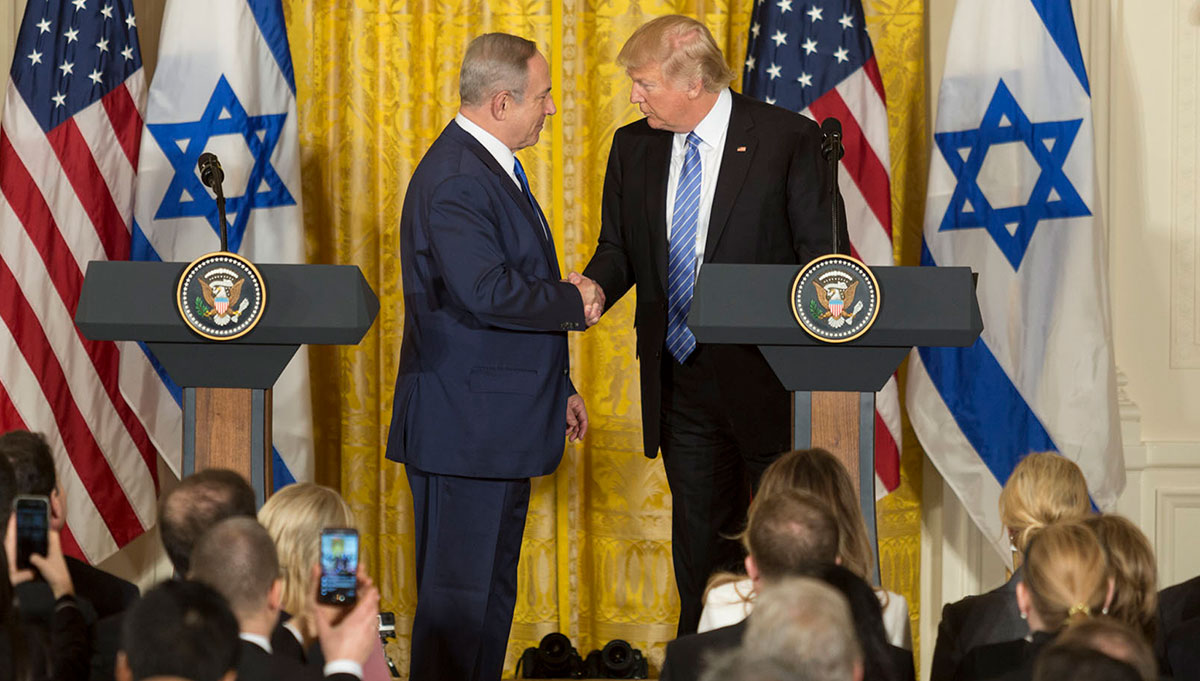Late last month, the Trump administration revealed its long awaited Peace to Prosperity plan—a framework for peace between Israel and the Palestinians. The Trump administration has apparently gone to great lengths to put this plan, “The Deal of the Century,” together. It has been spearheaded by President Trump’s son-in-law Jared Kushner since the beginning of the administration, and is a hefty 181 pages long.
What are the basics of the plan? It’s a two state solution, but in contrast to previous US backed plans, does not call for Israeli withdrawals from communities in Judea and Samaria. Instead, Israel would annex these communities, as well as the Jordan Valley. The plan also focuses on creating secure and defensible borders for Israel.
At the same time, it attempts to maximize the territorial contiguity of the proposed Palestinian State. The plan provides for big investments in infrastructure, with new tunnels and roads—including a highway connecting the northern portion of the territory with Gaza. It commits $50 billion in new investment over ten years, into the Palestinian economy.
 A preliminary map released by the White House showing borders and basic infrastructure of the proposed Palestinian state.
A preliminary map released by the White House showing borders and basic infrastructure of the proposed Palestinian state.
The plan presently specifies that 15 Israeli communities will become enclaves in the new Palestinian State. That is, they will be surrounded on all sides by Palestinian territory, restricted to building within fixed boundaries, and connected to Israel by a road passing through the Palestinian State.
Responses to the Plan
Israelis
Most Israelis seem to be in favor of the plan. The day before revealing the plan with Prime Minister Netanyahu at the White House, President Trump met with Netanyahu as well as the leader of the opposition party, Benny Gantz. These men, leaders of Israel’s two largest political parties—one of which will lead Israel’s next government pending a successful outcome in the March election—are both in agreement with the plan. The two parties represent more or less Israel’s political center, with Netanyahu’s Likud to the right and Gantz’s Blue and White, to the left. The Likud has already assembled a team to study the maps the Trump administration released, and address issues such as the noninclusion of Hebron, and large stretches of the crucial route 60 being completely in Palestinian territory. Benny Gantz and the Blue & White Party, though in agreement with the plan, may be in favor of making more territorial concessions to the Palestinians.
Leftist organizations in Israel have rejected the plan because of the small size of the proposed Palestinians state, and limitations on Palestinian sovereignty. Also, many of them dispute the legitimacy of Israeli settlements to begin with and therefore object to the plan on the grounds that it leaves all of these settlements intact.
The Israeli right opposes the creation of a Palestinian state, mainly for religious and security reasons, yet most see the plan as a good thing for Israel. The wide acceptance and optimism regarding the plan rests on the perception that the Palestinians will never accept it. The plan is a big step forward for Israel—unilateral annexation of all Israeli settlements and the Jordan valley, amounting to 30% of Judea and Samaria (the West Bank).
The Palestinians
The optimism of the Israeli right that the Palestinians will never accept the Peace plan is certainly well founded. Already, the Palestinian Authority (PA) has vehemently rejected the plan. “We say 1,000 ‘no’s to this deal,” declared PA President Mahmoud Abbas, referring to the deal as the “Slap of the Century.” This latest rejection showcases decades of Palestinian obstinacy; Israel has extended numerous generous offers of land and statehood to the Palestinians over the years, and has been rebuffed each time. It’s worth noting that the Palestinian national cause was created in the 20th century as part of the Arab strategy to destroy Israel. In this context, it is easy to see why the Palestinians have rejected offer after offer—because peace is not their end-goal. They do not want land unless it’s all the Land—”from the River to the Sea.” The plan also lists criteria which would be difficult if not impossible for the current leadership to fulfill, given the fact that their whole government has been built on perpetuating the refugee crisis and inciting hatred against Israel. The plan calls for the incitement to stop, for the pay-to-slay programs to end, and for the complete disarmament of Hamas, among other things.
In contrast to the Palestinian reaction to the plan, one thing that is different this time around, are the responses of other Middle Eastern nations. In attendance at the White House were representatives of the United Arab Emirates, Oman, and Bahrain. Saudi Arabia and Egypt also came out in support of the plan.
The European Union
The European Union has remained mostly silent regarding the peace plan specifically, but their leadership has made it clear that they are against Israeli annexation of any pre-1967 territory. This is no surprise considering the EU’s financing of illegal Palestinian construction in Judea and Samaria. Earlier this month, however, an EU resolution condemning the US plan, was shot down before adoption by six member-nations.
What has the reaction of the pro-Israel evangelical Christian community been to this plan? Evangelical Christians are at the core of President Trump’s base, and he has shown a propensity to listen to their interests and concerns.
The largest pro-Israel Christian organization in the United States, CUFI (Christians United for Israel), issued a statement in response to the proposal. John Hagee who founded the organization, which now boasts over 8 million members, articulated their position:“This plan reflects that tradition and is the best peace proposal any American administration has ever put forth. The President’s vision ensures Israel’s defensible borders, a united Jerusalem, sovereignty over biblical holy sites, and provides an opportunity for the Palestinians to choose peace. CUFI, as we have since our founding, stands with the decisions of the democratically elected government of Israel…”
HaYovel, the largest Christian volunteer organization in Judea and Samaria, has taken a different position—covering this issue extensively in blogs and podcasts—based on what the Bible says about the Land of Israel. Zac Waller, the Executive Director of HaYovel highlights three parts of the deal that make it something Israel must never accept:
- “Land that God promised to the Jewish people [would] be divided and given away, to form a Palestinian state…
- Israel [would] empower a regime that has publicly sworn, in official documents, to annihilate them…
- Many Jews currently living in Judea and Samaria [would] beconfined to enclaves/ghettos so that the Palestinian state can be Judenrein (without Jews)…”
Tommy Waller, founder and president of HaYovel explained their position further in the Jerusalem Post:
“As we heard the term ‘Palestinian state’ spoken by the president our hearts broke… Not one of us felt like celebrating. Why? Many faithful followers of the president have said the ‘Deal of the Century’ is wonderful, amazing, even brilliant. The one reason for this excitement we have heard over and over is, ‘The Palestinians would never accept it, so why do we need to worry?’ Really? We are excited about a plan because we know the Arabs will not accept it? And what would we do if they did accept it? Do they even need to accept it before it will be implemented?”
Waller draws attention to the fact that the Palestinian leadership has proven itself an untrustworthy partner for peace time and time again, and sees Israel exercising sovereignty over the Land promised to it by God as the key to stopping the violence that has traumatized Israel’s Jews for too long:
“Today, there are families on every street in the Jewish communities of Judea and Samaria that have felt the horrific pain inflicted by an Arab terrorist. Israel’s restoration until now has been recognized only through bloodshed… It is time to change the narrative. We have the opportunity now to see it happen. This is not the time for indifference. This is the time for all those who confess a sincere belief in the… God of Israel to walk out their faith. If not now, when?”
Conclusion
A big factor in determining the future of the peace plan is the outcome of the Israeli elections on March 2. Israelis will go to the polls for the third time in less than a year, due to gridlocks in forming a government. The Peace plan has taken a central role in the campaigns, and will be sure to remain a present issue once a new government is in place.





Bob Boynton
March 10, 2020
The land all the way to the Eurphrates river is their’s